|
A New Student's Profile
The new student is a young professional with a keen interest in learning to play jazz piano. They took piano and trumpet lessons in high school. They have a basic understanding of music theory. Aural skills are excellent. Their program will include the following components:
David
0 Comments
Theoretically yes. The internet is full of hucksters telling you that learning to play the piano is easy. It's not, but it is fun. Every day I watch my students grow; the days turn into years. And, inch by inch, progress is made.
If I can help you on your journey, call me. David Revised August 2022 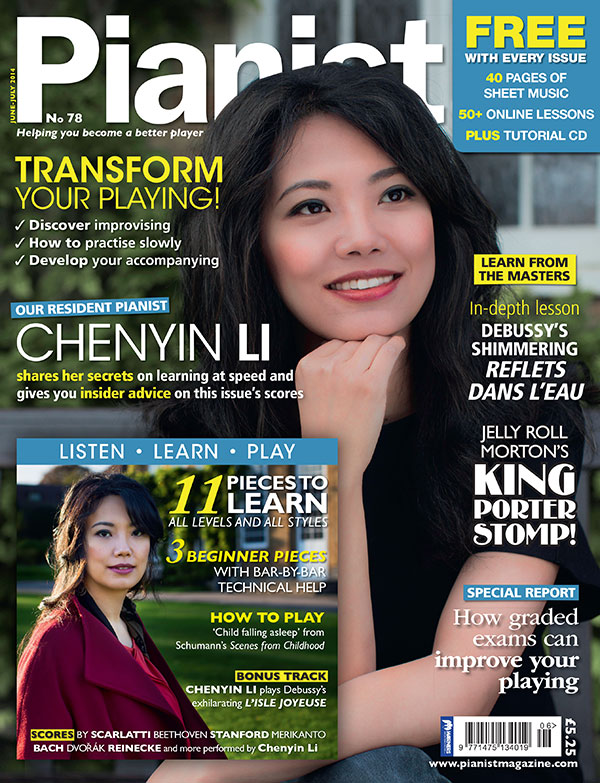 Restarting piano after a 4-decade hiatus? How to get started. The hands will be slow. But they will improve. Patience is the key here. An analogy: You were at 18-year-old track star back in the day. You buy a pair of expensive running shoes, the kind that promise speed, endurance, and youth. First day out, you run 10K. It is glorious, next day you can’t move. Shoes go in the closet; you are back in front of Netflix. Oops, you’ve made a tactical mistake. Try this instead.
Have fun, if I can help, call me. David Listen to superb musicians playing great music. It is a musical truism: "we are who we listen to" because who we listen to inculcates the sound of the music into our being. This inculcation will colour how you play.
Try this on your next new piece.
Have fun. David Revised January 2024 Depends on your goals.
If you would like to plunk out a few melodies, with minimal left-hand accompaniment, it is not too difficult. I would say a few months to a year you will be on your way. Factors that are important to consider though.
If you would like to play Classical piano at say grade 8, or early advanced level. Give it a decade from a standing start. In addition to the points above I would add the following: learn to love every aspect of the game. Do not skip a step: technique, repertoire, ear training, theory, history, etudes, etc. There are no hacks or shortcuts. If you would like to play Jazz piano in a band, assuming you have already reached level 8 in abilities, give it a couple of years. All the points above are valid with the addition of a few other steps.
If I can help, please call. David Story Before the current crisis about 1/3 of my student body had their lessons online. Now it is everyone.
I've lost 3 students. Two lost their jobs, one didn't like online lessons. We all look forward to resuming once the virus moves on and they get back to work. Five new students have been added in the same timeframe. I now meet my music coaches online now as well. Today with my "classical coach', last week with my "jazz coach". Every week with my drum coach. I believe a number of students will remain online after the crisis lifts and the others will resume as they were. If I can help you, Call me. David Be prepared for:
Playing the piano is very physical, so your fitness and energy level will be a larger factor in your evidential success. Tips to keep the journey moving along
David BTW I took up drumming at age 50. I now play with the Toronto Concert Band. April 2023  I instruct many adults who, later in life, are returning to the piano. They are keen to realize their dream of playing Classical, Jazz, Blues, or Boogie Woogie piano with style and panache. Why do they restart? They want to reconnect with beauty. Regardless of why they quit, everyone returns filled with high hopes and noble intentions. I welcome them into a studio where lessons are given guilt free. And enthusiasm is supported and encouraged. Here are some of the titles they are currently working on.
Cheers, David updated October 2023 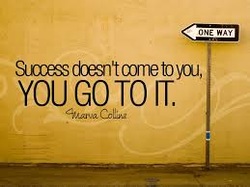 1. Communicate with your teacher your goals and aspirations. 2. Do your homework, consider that the so called boring bits are the important bits. I know, I take drum lessons. The new teacher is trying to get me to play quarter notes properly with the good tone and arm motion. This is requiring hours of concentrated effort. But, the musicians I play with can hear the difference already. 3. Participate in recitals. Everyone needs positive, self esteem building events. 4. Explore music outside of lessons: Sight read, attend concerts, listen to music, buy a music magazine, watch Youtube videos, attend a summer camp. (I'm going to Louisville Kentucky and Oxford England this summer for music training in both drumming and classical music). 5. Read Time Power by Brian Tracy. The best book on time management I know. Amy Chua's books are an interesting read for both parents and mature music students. 6. Remember musicians live to practice, performance is just the icing on the cake. Cheers, David Story Piano Teacher and drumming enthusiast. 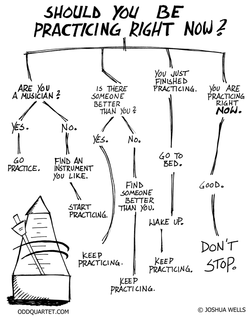 There are many ways to think about our musical development. I've produced the following: Level one, student: At level one the student learns to control their hands. i.e. the hands do what they are told. I'm told this takes about 10,000 hours. I believe it. This level is about technique, repertoire, ear training, theory studies, concert going, and practice, practice, practice. It is about following the teachers' directions, and maintaining and nourishing your personal curiosity, patience, and faith in the process. Level two, professional: At level two you have professional hands that do what they are told. At this level you practice maintaining and refining your skills. Level three, artist: At level three you have something interesting to say and the ability to communicate it. Artists blend this elevated level of creativity and skill into dazzling musical displays. How do you become an artist? I don't know. However, I do know you must go through the first two steps to reach level three. Too many folks try to skip all or part of the first two steps in their haste to be "artists." This is misguided, naïve, and foolish. Conclusion? Get off the internet and go back to the practice room! Cheers, David Story January 2023 update  A tale of two adult students Part one:
Part two:
Cheers, David Story 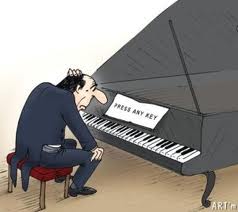 I was thinking...
Hilariously absurd. Yet millions apparently attempt to teach themselves piano on-line. And, there are lots of folks willing to sell you a miracle DVD, book, subscription in your quest. No teacher needed they proclaim. Some people spend a lifetime looking for shortcuts and online freebies, when a few short years of focused effort and disciplined practice with a professional teacher would lead to the results they seek. My favorite is the "Play what you want promise" A common desire. But in order to play the latest chart topper a few basics need to be addressed i.e. how to get the dots off the page and into your fingers? No shortcuts here. A competent teacher can guide you through that little roadblock in short order. A competent teacher will want you to play the music you love. They also know the quickest way to get there: professional instruction, a willing student, lots of focused effort. Focused effort is practice, bench time, rehearsal, wood-shedding, what ever you call it, result=input, cause=effect, karma, you get the point. The miracle is practice. The shortcut is work. Cheers, David Story 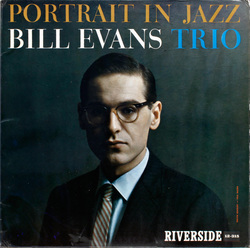 “Surrender to the expert”, great advice. Be teachable. With that in mind I came up with these thoughts. The take away: your teacher probably knows best. Complete your lessons, then fool around following your own muse. Why?
Cheers, David 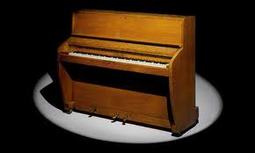 People want to learn to play an instrument fast. (I included). We dream about performing the Moonlight Sonata, jamming the blues, or playing Christmas carols in just weeks. Two weeks would be ideal to quote Leo Babuata. Search for “learn piano fast" in Google and you get 418,000 hits. The proprietors make wild claims and promises. Bunk, of course. Let us take a closer look at what it would take to play well. Focused practice on the right things for a start. Playing an instrument is primarily an athletic event. Physical skills take time and guidance. Of course, there are people who can guide you more effectively and quicker than others. However, few people can teach themselves past a rudimentary level. It would be like trying to achieve your black belt from watching Youtube. An absurdity. Now assuming you have a competent teacher, in person or online, you have to learn effective practice habits. The habits of the pros. (I swear some people spend more time looking for shortcuts than the time it would take to learn properly in the first place) Before you dive in with plans of practice marathons, I suggest you start slowly and build some good habits, habits that will raise the odds of success. Step one: Listen to a competent recording of your pieces before starting to play. Then complete the assignment, and afterwards fiddle about. Step two: Explore the instrument, improvise, and noodle about. Step three: Add a little time each week to your practice sessions. Step four: Inspire yourself by reading magazines for students like Keyboard, Pianist, Modern Drummer, Downbeat, etc. Step five: Have faith in your progress. It is a lot of work to learn to play well. I practiced about 400 hours before I could play drums in an amateur band and not embarrass myself too much. Now I am up over 1000 hours in almost 3 years. If it takes 10,000 hours to reach expert status, at this rate I will be 80 years old. Nevertheless, I will be swinging hard. My goal is to add one extra hour per month to my practice schedule. Now my drum practice is about 6 hours a week. By the end of the year, I hope to have it up to about 12 hours a week. Which will cut the 30 years down considerably? (In my forties, I studied and obtained my ARCT in piano pedagogy. I put in five thousand hours over 4 years of practice and study. I succeeded at it, and had an excellent finish, but the experience was the most difficult thing I ever did in my life, period. Berklee College of Music was a walk in the park compared to that experience.) Final thought: Celebrate the small victories because it is the journey that counts. These thoughts and acts will help tame the practice monster and give you some inner peace to help you persevere through the difficulties, defeats, and triumphs of learning to play well. Cheers, David |
You've got to learn your instrument. Then, you practice, practice, practice. And then, when you finally get up there on the bandstand, forget all that and just wail. AuthorI'm a professional pianist and music educator in West Toronto Ontario. I'm also a devoted percussionist and drum teacher. Categories
All
|
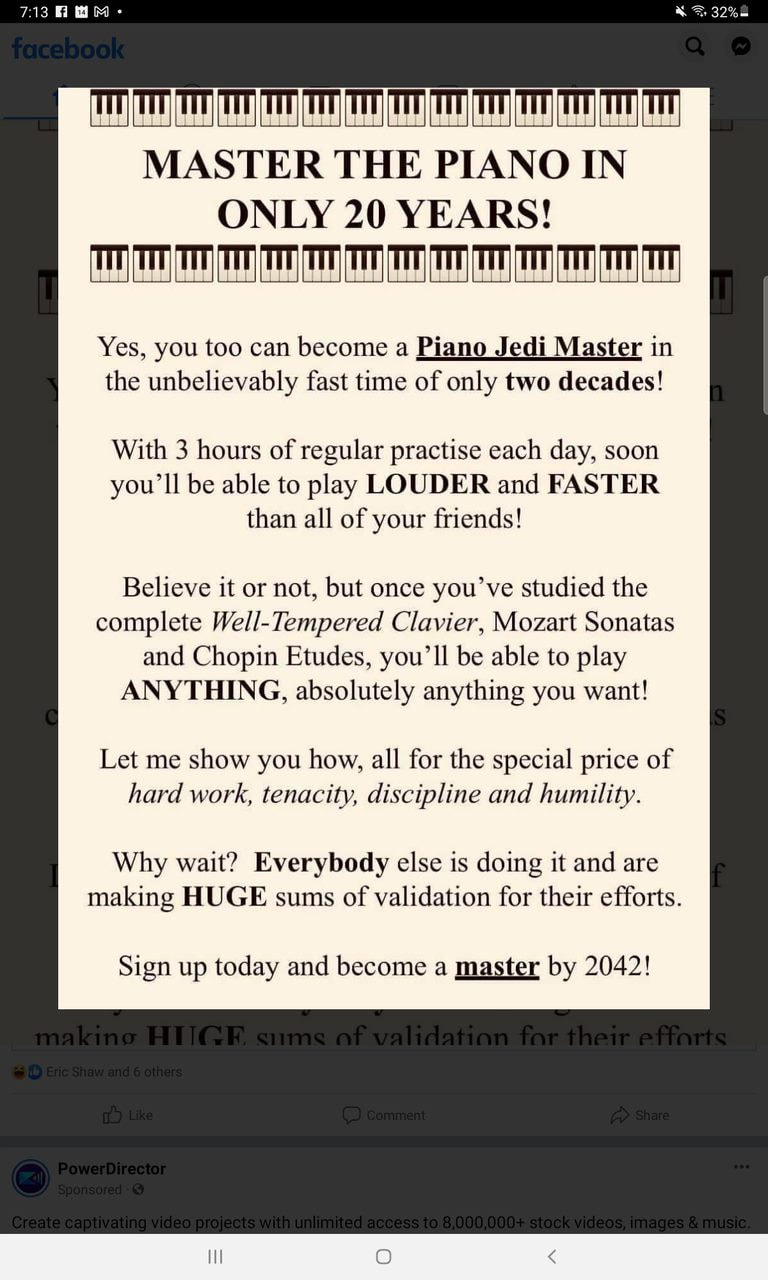
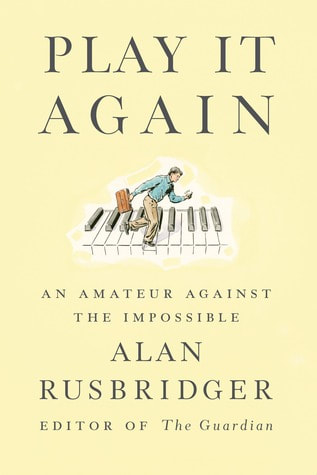
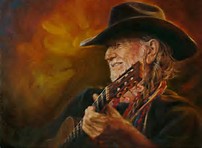
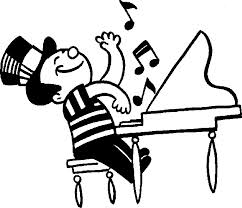
 RSS Feed
RSS Feed